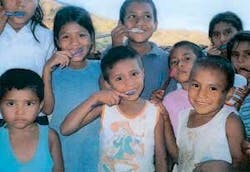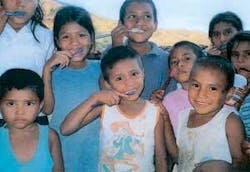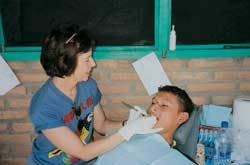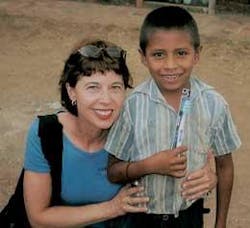Cape CARES
Central American program notes progress in teaching rural Hondurans about the importance of preventive dental care.
Dogs run through the yard. Pigs munch noisily outside the gate, and chickens scratch the dirt near our feet. Is this any way to run a dental clinic? The answer is yes, when it is in the village of San Marcos in the mountains of Honduras, not far from the border with El Salvador. For the past five years I have been part of a dental team with Cape CARES (Central American Relief Efforts).
Cape CARES, started in 1989 by a Massachusetts dentist, is a group of more than 100 volunteers who donate time and resources to the needy of Honduras. Volunteers include physicians, nurses, dentists, dental assistants, dental hygienists, pharmacists, translators, and support personnel. Each year eight to 10 teams visit three sites in Honduras to provide much needed health care. Cape CARES provides dental and medical care to the people of San Marcos and surrounding villages three times a year. Even though there are doctors and dentists in the nearby big cities (and, yes, orthodontic treatment and cosmetic tooth whitening are available), there are no doctors or dentists in the sparsely populated areas.
The only health care available to the villagers is provided by American volunteers every few months. Three dentists (Dr. Randall Baldwin, Dr. Ron Berghoff, and Dr. Gordon Pettit), a dental assistant (Jennifer Kadar), two dental hygienists (Sherrie Ellis, RDH, and myself) comprised the dental team. The medical component consisted of two physicians, one pediatric nurse, and one pharmacist. Four support personnel, including translators, assisted.
San Marcos is a small village in the rugged Honduran mountains in the western part of the country. It is located about six hours from the capital of Tegucigalpa in a remote area with no electricity or running water. We traveled over rough narrow roads in four-wheel drive vehicles that carried equipment and supplies. Often, only sticks or stones served as “guardrails” along the mountainside roads. During the rainy season many of these roads become impassable.
We stayed and worked in a large community building in San Marcos. By day, it was a health clinic and, by night, our dormitory. We set up the dental clinic on a wide porch surrounding the building, and the medical clinic was inside. We provided care for the people of San Marcos and 18 surrounding villages. Often, people walked for up to five hours in the hot sun to visit the clinic, then waited patiently for another hour or two until it was their turn.
Cape CARES volunteers visit San Marcos in January, March, and June. Although all three teams provide dental care in the form of extractions, the March dental team also provides simple restorations and oral prophylaxis. Dental patients used to sit in reclining beach chairs or plastic resin patio chairs, but this year we were able to bring a portable dental chair. We do not have X-ray machines or electricity, and we must illuminate the oral cavity with flashlights. We use a gasoline-powered generator to run a portable dental unit so that we can provide simple restorations. A modified vacuum cleaner serves as our suction system, and a large pressure cooker on a propane camp stove is used to sterilize instruments. Although we are able to do simple resin restorations and some general scalings (no cavitron units here) the majority of teeth are badly decayed and broken, so extractions are the most common procedure.
Most of the people in this area do not have a high regard for their teeth, and good dental health is not a priority. The majority of patients who visit the clinic want to have their teeth removed. They believe teeth are a problem if they hurt, and are a potential problem if they do not hurt. Most of the people assume teeth naturally decay and must be removed. Many Hondurans chew on sugar cane stalks that are fibrous and serve as a primitive toothbrush. However, the sugar is a major contributor to the high rate of decay! The villagers do not understand the relationship between sugar and tooth decay, or the importance of good oral hygiene. Nearly everyone is poor and cannot afford toothbrushes or toothpaste. The idea that teeth can be restored and preserved is new to them, and the notion that dental decay can be prevented through good oral hygiene and limited sugar consumption indeed astonishes them.
The number of people requesting oral prophylaxis and dental restorations as opposed to extractions is increasing each year, and this year 25 percent of all dental procedures were oral prophylaxis, a new high. Many of the people visited the clinic last year for preventive care, and it was satisfying to see that they now understand the importance of regular dental care. We were able to administer a group fluoride treatment to 27 children. They enjoyed brushing fluoride gel on their teeth for one minute and then having a spitting contest!
Education is the first step toward improving the dental health of the people in this area. Each year we visit elementary and upper schools to teach daily oral hygiene. Honduran children are required to attend school through the sixth grade, but additional schooling is available only for a fee, and many families cannot afford higher education for their children.
The schoolchildren in my hometown of Ridgefield, Conn., hold an annual toothbrush drive to collect new toothbrushes for distribution to Honduran schoolchildren. This year, we took over 4,000 toothbrushes to Honduras. The middle school students studying Spanish make cards and letters in Spanish to help teach good oral health habits.
Posters and pamphlets on a variety of health issues were produced by high school students, and we distributed these to the local schools and emergency health clinics. The nurses in these clinics primarily make referrals to doctors and hospitals that are several hours away, so they appreciated whatever we could provide to help them educate their people. When we returned home, the schoolchildren in my hometown were happy to hear stories and see our pictures of the Honduran children who received the toothbrushes. Cape CARES has become quite an outreach project from the Fairfield County community to the western Honduran community, and everyone benefits from the experience!
I will lead a group of Cape CARES volunteers to San Marcos again in March 2006. I am working with more schools in Connecticut to provide more toothbrushes and health brochures, and I hope our Honduran friends are looking forward to our return as much as we are.
Cape CARES sends teams to three villages in Honduras several times a year. Volunteers are always needed, as are donations of equipment and supplies. For information on how you can help, contact Christel Autuori at [email protected] or visit the Cape CARES website at www.capecares.com. You may also write to Cape CARES, One River Street, South Yarmouth, MA 02664.
Christel Autuori, RDH, BS, is based in Ridgefield, Conn. She can be contacted at (203) 788-0647 or [email protected].



